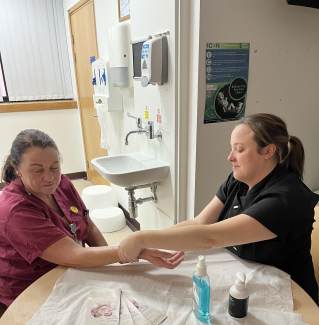Staying safe online
Staying safe online
With the introduction of both online and blended learning models it is essential that all learners are aware of the dangers posed within the use of technology and the internet and how to keep themselves safe from potential risks. E-safety basically means electronic safety. E-safety applies to everyone, not just children and young people.
E-safety is important to everything we do online from social media and shopping to banking and working. But it’s not just about home computers; it includes smart phones, laptops and tablets too.
The virtual world has opened up millions of opportunities for everyone to work, learn and be creative but we need to remember that it has also brought challenges for us as individuals, our family and friends and our communities. We all need to understand this and know how we can stay safe online.
We all like to think that we know how to protect ourselves online, but how easy are we making it for ourselves to become a target of fraud, identity theft, bullying or worse? To see how safe you are online ask yourselves these questions:
• Do you use the same password for all of your online accounts such as banking, shopping, and social media?
• How unique are your passwords are they simply your date of birth, mother’s maiden name or the name of your nearest and dearest?
• How much information about yourself do you share online?
• Who has control over what photos, images or stories about you are being added to social media?
• Who has access to this information? You, your friends or everyone?
• Have you had Facebook friend requests from anyone who seems suspicious? They may be extremists, and if they are persistent, you should report this to a member of staff and/ or the Police.
This is what e-safety is all about, recognising the risks and knowing what we can do about it to minimise those risks. There is a huge amount of advice and guidance available online on using the Internet and social media technology safely, particularly for children and young people. To access this information enter the phrase ‘Staying Safe Online’ into any search engine or visit the following sites:
• Think u know
• Digizen.org
• Childnet.com
Our website also has some helpful information for preventing cyber bullying and peer on peer abuse.
Chromebooks
Please note if you have a Newcastle City Learning issued Chromebook this must be used for your college work only, and not for other activities by yourself, family or friends. Internet access is monitored and we may ask for your Chromebook to be returned if unauthorised usage occurs.
Cyber Streetwise
Cyber Streetwise is part of the government’s national cyber security programme aiming to change the way people view online safety. This interactive website provides advice such as installing antivirus software, strong passwords, online shopping and social privacy settings to help people enjoy a safer experience online.
The most recent National Cyber Security Consumer Tracker highlighted that consumers are not taking precautions to protect themselves online. Only 44% of consumers said they always install internet security software on new equipment, and 37% download updates and patches for personal computers. 32% of consumers who admit to not installing security software on internet devices blame a lack of understanding, while 18% say they did not realise the risk.
To find out more about Safer Internet Day, Cyber Streetwise and all of our other hints and tips follow us on Facebook and Twitter #ccsafeinternet.
Protecting your information
Information is at the centre of the Council’s business. We handle millions of pieces of data each week and it is vital that this is handled and managed effectively. You can find out more about how we use your information on our website.
We have a statutory duty to comply with all information management legislation and national guidance and ensure that we are protecting the information we possess about our customers, employees and contractors.
We must abide by the principles and rights set out in the Data Protection Act and the Freedom of Information Act, and will follow guidance given by the Information Commissioner and other national bodies as necessary.
Safeguarding
If you have any concerns at all about your own or other people and their safety online, please talk to a member of staff or contact our Safeguarding Leads, Colleen Pittman or Sam Riley for learners aged 16-18 and Hardus du Plessis for 19+ learners on 0191 2773520 or email
hardus.duplessis@newcastle.gov.uk
colleen.pittman@newcastle.gov.uk
samantha.riley@newcastle.gov.uk

